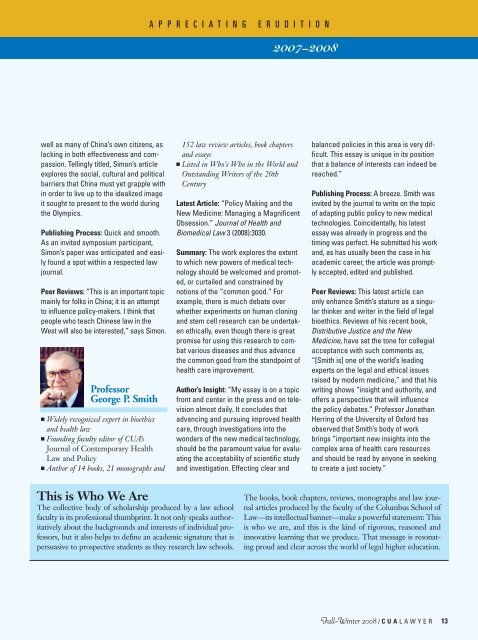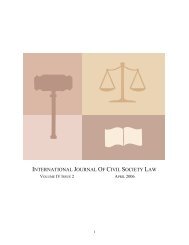On The Record - Columbus School of Law
On The Record - Columbus School of Law
On The Record - Columbus School of Law
- No tags were found...
You also want an ePaper? Increase the reach of your titles
YUMPU automatically turns print PDFs into web optimized ePapers that Google loves.
A P P R E C I A T I N G E R U D I T I O N2007–2008well as many <strong>of</strong> China’s own citizens, aslacking in both effectiveness and compassion.Tellingly titled, Simon’s articleexplores the social, cultural and politicalbarriers that China must yet grapple within order to live up to the idealized imageit sought to present to the world duringthe Olympics.Publishing Process: Quick and smooth.As an invited symposium participant,Simon’s paper was anticipated and easilyfound a spot within a respected lawjournal.Peer Reviews: “This is an important topicmainly for folks in China; it is an attemptto influence policy-makers. I think thatpeople who teach Chinese law in theWest will also be interested,” says Simon.Pr<strong>of</strong>essorGeorge P. Smith■ Widely recognized expert in bioethicsand health law■ Founding faculty editor <strong>of</strong> CUA’sJournal <strong>of</strong> Contemporary Health<strong>Law</strong> and Policy■ Author <strong>of</strong> 14 books, 21 monographs and152 law review articles, book chaptersand essays■ Listed in Who's Who in the World andOutstanding Writers <strong>of</strong> the 20thCenturyLatest Article: “Policy Making and theNew Medicine: Managing a MagnificentObsession.” Journal <strong>of</strong> Health andBiomedical <strong>Law</strong> 3 (2008):3030.Summary: <strong>The</strong> work explores the extentto which new powers <strong>of</strong> medical technologyshould be welcomed and promoted,or curtailed and constrained bynotions <strong>of</strong> the “common good.” Forexample, there is much debate overwhether experiments on human cloningand stem cell research can be undertakenethically, even though there is greatpromise for using this research to combatvarious diseases and thus advancethe common good from the standpoint <strong>of</strong>health care improvement.Author’s Insight: “My essay is on a topicfront and center in the press and on televisionalmost daily. It concludes thatadvancing and pursuing improved healthcare, through investigations into thewonders <strong>of</strong> the new medical technology,should be the paramount value for evaluatingthe acceptability <strong>of</strong> scientific studyand investigation. Effecting clear andbalanced policies in this area is very difficult.This essay is unique in its positionthat a balance <strong>of</strong> interests can indeed bereached.”Publishing Process: A breeze. Smith wasinvited by the journal to write on the topic<strong>of</strong> adapting public policy to new medicaltechnologies. Coincidentally, his latestessay was already in progress and thetiming was perfect. He submitted his workand, as has usually been the case in hisacademic career, the article was promptlyaccepted, edited and published.Peer Reviews: This latest article canonly enhance Smith’s stature as a singularthinker and writer in the field <strong>of</strong> legalbioethics. Reviews <strong>of</strong> his recent book,Distributive Justice and the NewMedicine, have set the tone for collegialacceptance with such comments as,“[Smith is] one <strong>of</strong> the world’s leadingexperts on the legal and ethical issuesraised by modern medicine,” and that hiswriting shows “insight and authority, and<strong>of</strong>fers a perspective that will influencethe policy debates.” Pr<strong>of</strong>essor JonathanHerring <strong>of</strong> the University <strong>of</strong> Oxford hasobserved that Smith’s body <strong>of</strong> workbrings “important new insights into thecomplex area <strong>of</strong> health care resourcesand should be read by anyone in seekingto create a just society.”This is Who We Are<strong>The</strong> collective body <strong>of</strong> scholarship produced by a law schoolfaculty is its pr<strong>of</strong>essional thumbprint. It not only speaks authoritativelyabout the backgrounds and interests <strong>of</strong> individual pr<strong>of</strong>essors,but it also helps to define an academic signature that ispersuasive to prospective students as they research law schools.<strong>The</strong> books, book chapters, reviews, monographs and law journalarticles produced by the faculty <strong>of</strong> the <strong>Columbus</strong> <strong>School</strong> <strong>of</strong><strong>Law</strong>—its intellectual banner—make a powerful statement: Thisis who we are, and this is the kind <strong>of</strong> rigorous, reasoned andinnovative learning that we produce. That message is resonatingproud and clear across the world <strong>of</strong> legal higher education.Fall–Winter 2008 / C UALAWYER 13
















